It's Earth Month, and there's no better time to talk about what RMI Expeditions has been doing for years to protect the mountains we love. From Mount Rainier to Denali, RMI has been setting the standard for environmental stewardship in mountaineering for decades. And it all starts with a little thing called Leave No Trace.
But RMI didn’t just hop on the Leave No Trace train—it helped build the tracks. As the first guide service to achieve the Leave No Trace Gold Standard Outfitter and Guide designation, RMI has a storied history of contributing to LNT principles, particularly for the Alpine Zone. Let’s break it down.
What is Leave No Trace?
Leave No Trace is a set of outdoor ethics designed to promote outdoor conservation by minimizing human impact. Established by the Leave No Trace Center for Outdoor Ethics, it revolves around Seven Principles that guide responsible practices for enjoying natural areas while preserving them for future generations. The principles include:
- Plan Ahead and Prepare
- Travel and Camp on Durable Surfaces
- Dispose of Waste Properly
- Leave What You Find
- Minimize Campfire Impact
- Respect Wildlife
- Be Considerate of Other Visitors
While Leave No Trace applies to all outdoor environments, special considerations are needed for fragile alpine zones where plant life, wildlife, and natural features are particularly sensitive to human impact.
You can learn more at: https://lnt.org/
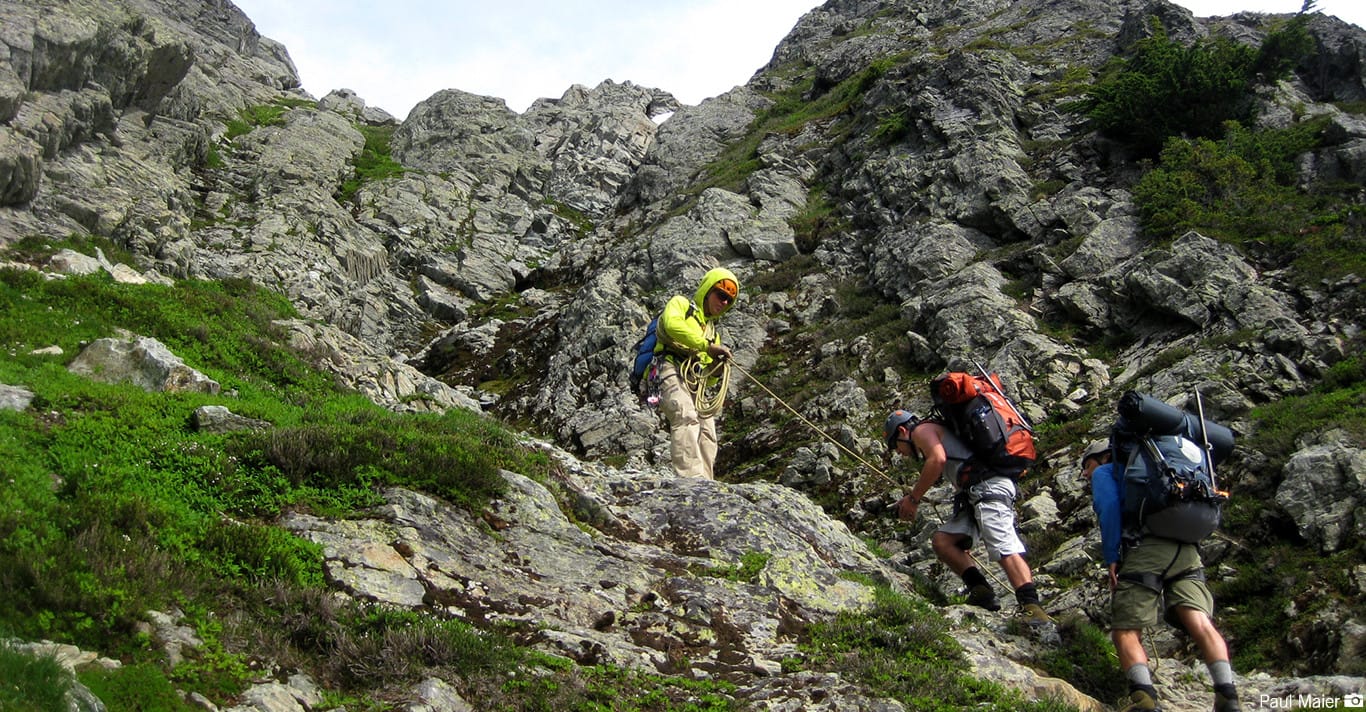
RMI's Role in Developing Leave No Trace Principles for the Alpine Zone
The early 2000s were not exactly known for pristine mountaineering practices. Waste (including human waste—yep, it’s gross but important) littered high-traffic peaks like Mount Rainier and Denali. RMI’s own Peter Whittaker realized the full extent of the problem firsthand after completing a Leave No Trace Master Course around 2003. Realizing the lack of established principles for the Alpine Zone, Peter took action.
Working with Mount Rainier National Park, RMI implemented the Blue Bag system, a simple yet effective way to manage human waste in delicate environments. But they didn’t stop there. RMI hosted a symposium that brought together concessionaires, climbing clubs like the Mazamas and Seattle Mountaineers, and park rangers to establish clear Leave No Trace guidelines for the Alpine Zone.
That effort resulted in the official LNT Alpine Zone protocols, helping to reduce waste and environmental impact on mountains worldwide. For a while, cards detailing these principles were handed out with climbing permits for Mount Rainier, ensuring that every climber understood their responsibility to protect the mountain.
RMI’s efforts didn’t stop with Rainier. As RMI expanded its operations to Denali, Kilimanjaro, Aconcagua, and Everest, it applied those same Leave No Trace principles to these new environments. Guides are trained to minimize impacts in different alpine zones, from volcanic terrain to high-altitude glaciated environments. RMI's influence has spread not only across the U.S. but internationally as well.
Additionally, RMI played a key role in developing specific LNT curriculum for mountaineering. Collaborating with the Center for Outdoor Ethics, RMI contributed to creating guidelines that are now applied worldwide. This dedication led to RMI being recognized as the first Gold Standard Outfitter and Guide by the Leave No Trace Center for Outdoor Ethics.
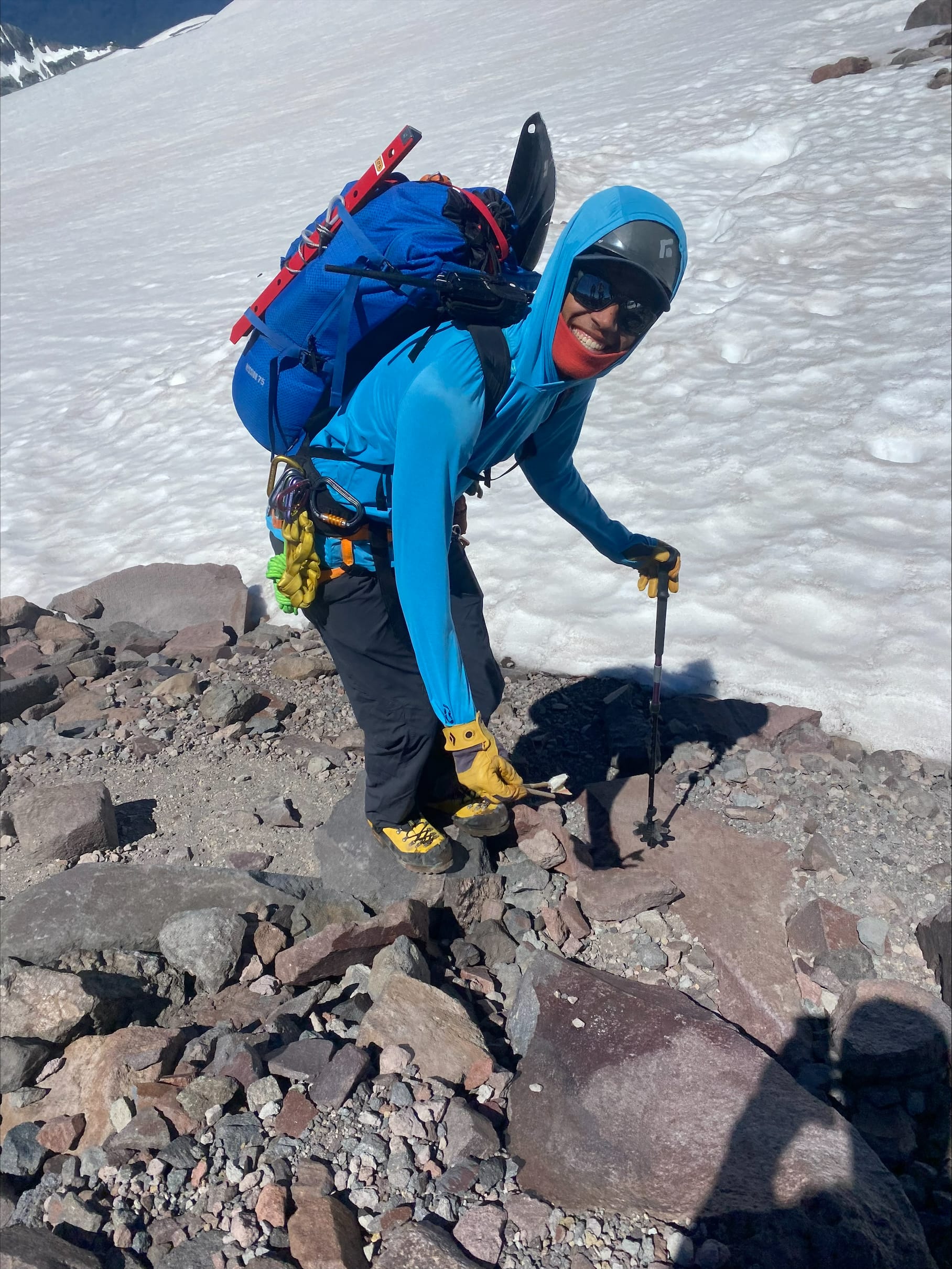
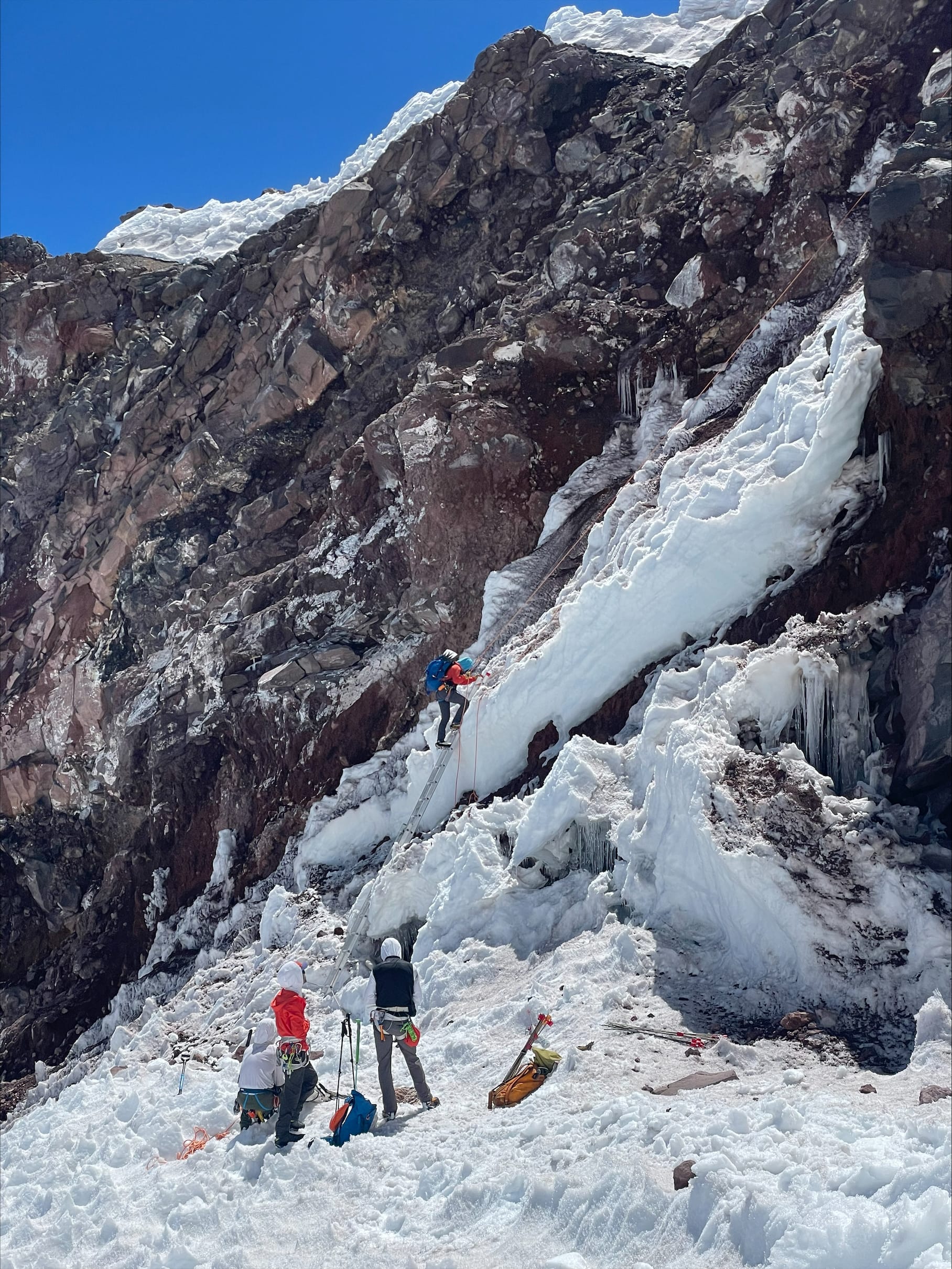
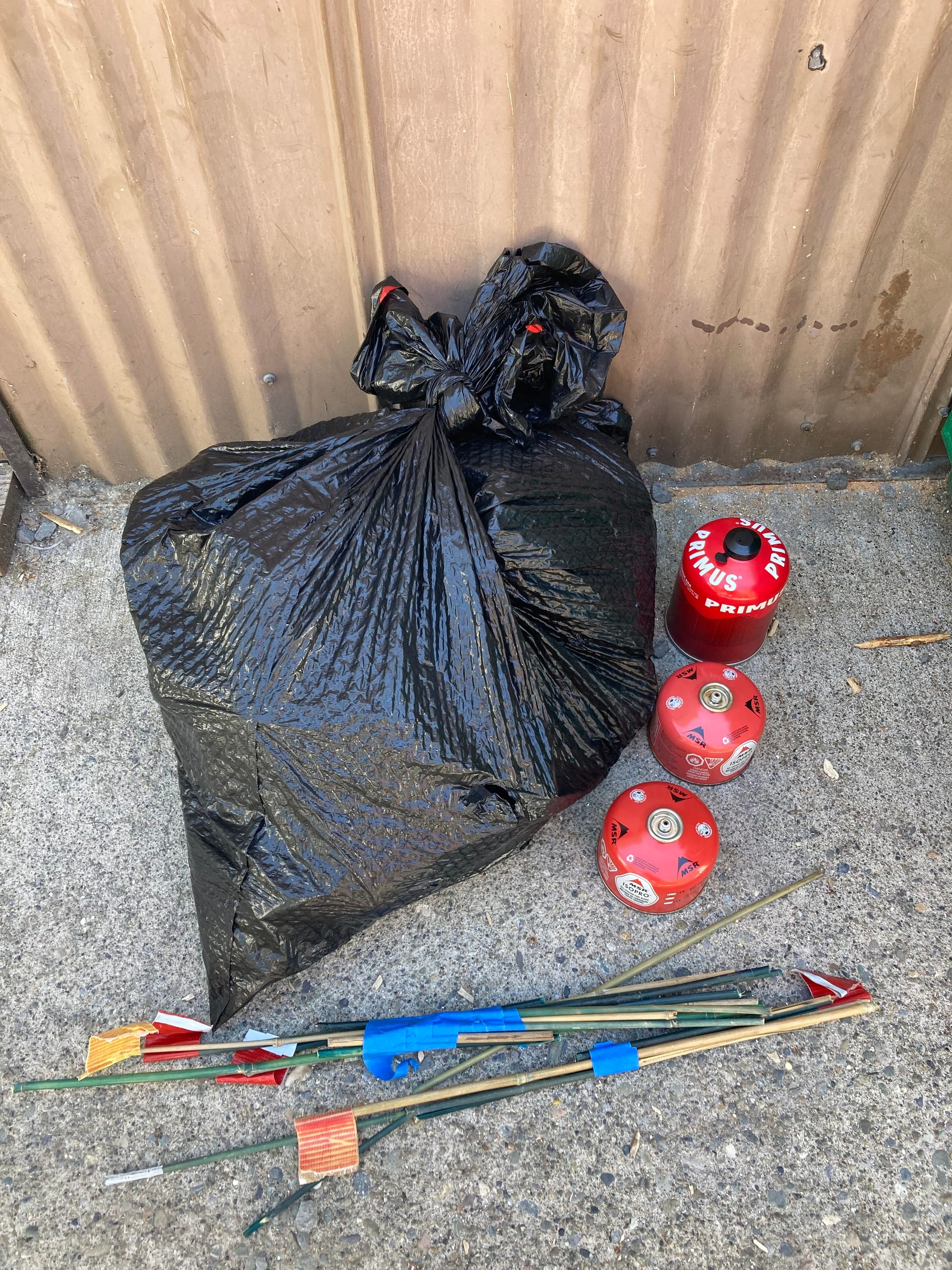
RMI Guides on Environmental Patrol in Mount Rainier National Park
RMI's Current Leave No Trace Initiatives
Today, RMI continues to raise the bar when it comes to sustainability. And we’re not just talking about lectures on recycling.
- Guided Clean-Up Patrols: Every year, RMI guides give 40 volunteer days (yes, they still get paid) to conduct Environmental Patrols on Mount Rainier. Currently, RMI Expeditions is the only guide service on Mount Rainier to conduct environmental patrols. We pick up trash, haul out waste, and even weigh it to track progress. Because nothing says dedication like lugging a bag of someone else's disgarded Blue Bag down a mountain.
- Helicopter-Free Operations: Unlike other guide services, RMI refuses to use helicopters to carry goods up to Camp Muir on Mount Rainier. All propane, food, tents, and gear are carried by human power. Why? Because preserving the wilderness experience is worth a little extra sweat.
- Denali Expeditions: RMI was the first commercially guided expedition to carry all of its trash off of Denali, starting in 2002. All expeditions in Denali National Park and Preserve are now 100% carbon neutral thanks to RMI's partnership with Ostrom Climate to offset greenhouse gas emissions.
- Leave No Trace Training for Guides: All RMI guides carry Leave No Trace Level I certifications, and each Denali expedition includes at least one guide with Level II certification. Additionally, LNT training is a standard part of RMI's guide training program.
- Shuttle Transportation: RMI was instrumental in leading the shift that required guiding services in Mount Rainier National Park to use shuttles instead of allowing clients to drive individual cars to paradise. By using hybrid shuttles, RMI not only reduces the emissions from our Rainier programs; we also cut down the line at the park entrance and free up dozens of parking spots each day for non-client park visitors.
- RMI's Global Impact: From Mount Rainier to Kilimanjaro, RMI promotes LNT principles everywhere it climbs. On Kilimanjaro, RMI groups have returned with over 20 lbs. of collected trash, proving that Leave No Trace isn’t just a local effort—it’s a global mindset.
RMI’s efforts have also extended to the Sustainable Summits Conference, where they work with other leaders in the climbing community to establish best practices for environmental stewardship. Sharing techniques, experiences, and solutions from expeditions worldwide continues to inform RMI’s approach to Leave No Trace.
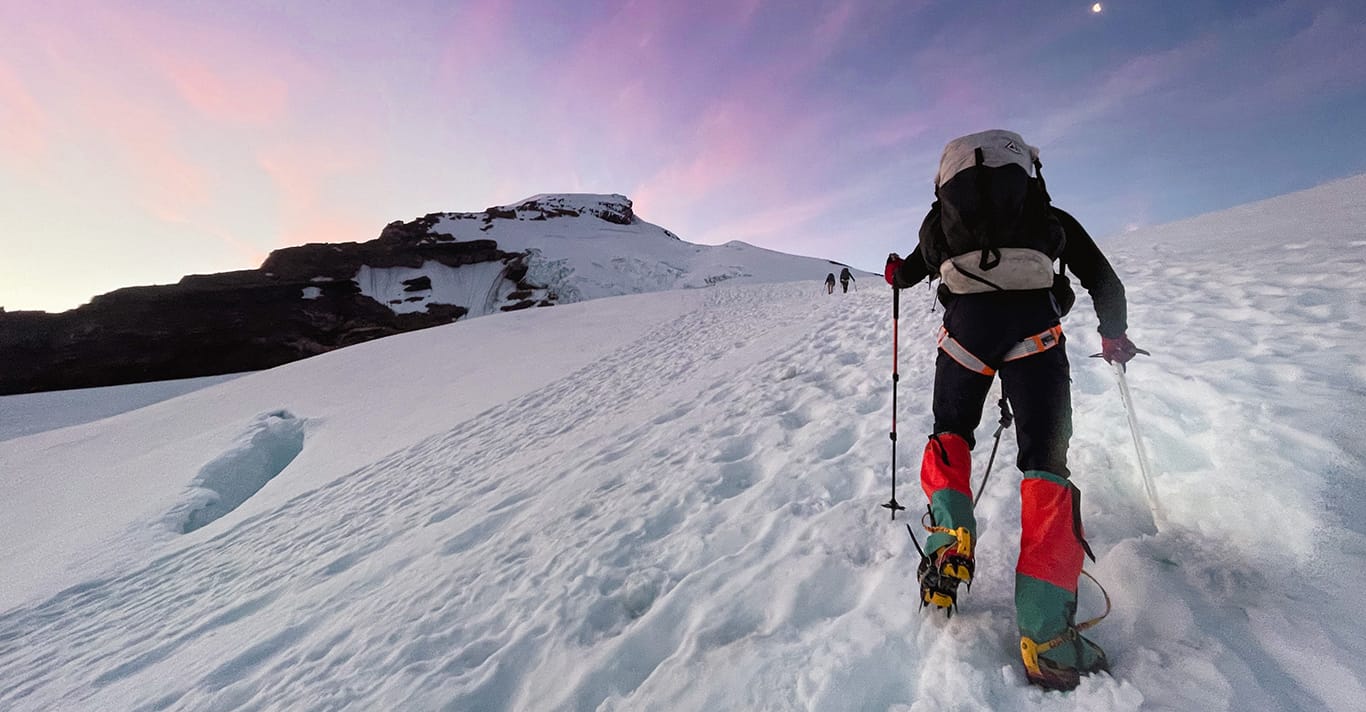
RMI’s Leave No Trace Level 2 Instructor Course on Mount Baker
RMI is one of the few guiding services to offer a Leave No Trace Level 2 Instructor Course, combined with a summit of Mount Baker. This five-day expedition combines climbing instruction with an immersive LNT curriculum, preparing participants to become Leave No Trace instructors themselves.
Participants learn how to plan and teach LNT courses, manage groups in the field, and apply Leave No Trace principles in alpine environments. Graduates are certified to teach LNT Level 1 courses, skills courses, and workshops. It’s a chance to not only climb one of the most beautiful peaks in the North Cascades but to do it responsibly—and teach others to do the same.
The Future of Leave No Trace at RMI Expeditions
RMI Expeditions isn’t just a guiding service. It’s a community committed to preserving the wild landscapes we explore. Whether it’s through implementing the Blue Bag system, running carbon-neutral expeditions, or teaching the next generation of Leave No Trace instructors, RMI continues to set the standard for environmental stewardship.
Interested in learning more? Check out our Leave No Trace Level 2 Instructor Course on Mount Baker and take your mountaineering skills to the next level—while ensuring the mountains stay pristine for generations to come.
Citations
- Leave No Trace Center for Outdoor Ethics. (n.d.). Plan Ahead and Prepare in Mountaineering. Leave No Trace.
- RMI Expeditions. (n.d.). Responsible Climbing. RMI Guides.
- Leave No Trace Center for Outdoor Ethics. (2024, July 18). Leave No Trace Announces Five New Gold Standard Designations.
- Linden Mallory, Senior Guide, RMI Expeditions. (2012, March 10). Guest Blog: Plan Ahead and Prepare in Mountaineering.
- National Park Service. (n.d.). Wilderness Guidelines and Regulations - Mount Rainier National Park. NPS.


